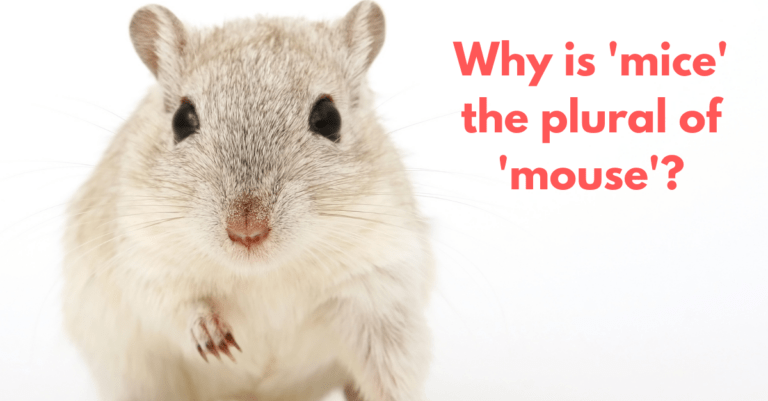Today’s topic is irregular plural nouns, odd nouns such as “ox” and “oxen.”
Robbie from Keene, New Hampshire, called in with this question:
One of my friends knows that I’m kind of geeky and into grammar and was asking me about adding the “-s” onto words to make the plural but in the same question came up with the question about words like “moose” and “mice” and “ox” and a “goose”—how all of those aren’t formed into the plural by adding the “-s.” And I was wondering if you can give any insight? Is there any rhyme or reason into this? Is it only animals that we don’t have to add an “-s” on to make it plural?
Robbie made me laugh when he placed a follow-up call asking me to imagine pluralizing all these words like the word “oxen”: “goosen,” “micen,” and “moosen.” Very funny. Perhaps we would say some plurals that way if we were all still speaking Old English. More on that in a minute.
In modern English, most of the time we make a noun plural by adding an “-s.” So the plural of “animal” is “animals.” Robbie, on the other hand, is asking about irregular plurals, and we’re going to delve into the history of English as we learn about three irregular types of plural nouns. Many irregular plurals in English do seem to be animal names, but odd plurals aren’t limited to animals.
Plurals Derived from an Old English Form
The first group of irregular nouns we’ll discuss come from an obsolete form in Old English. “Ox” and “oxen” fall into this category. Old English is a West Germanic language that was spoken and written in parts of what are now England and southern Scotland between the mid-5th and late-11th centuries (1). “Beowulf” was written in this language.
If someone from a thousand years ago traveled through time to visit us, we wouldn’t be able to understand each other, but as modern English evolved, it retained some elements of Old English. So we can blame Old English for the plural noun “oxen.” Only two other plural nouns in modern English end this way: “children” and “brethren.” Some other nouns, such as “eye,” “house,” and “hose,” used to be pluralized in a similar way, but the plural forms “eyen,” “housen,” and “hosen” are now dialectic or obsolete (2).
Seeing the word “hosen” reminded me of the German word “lederhosen,” which has a similar plural ending as these obsolete words. I’ve always known that English has many roots, including Germanic ones, but I haven’t actually studied German. The site I read to learn about German plurals tells me there are at least five different ways that German nouns can form the plural, one of which is by adding “-en” to the end (3).
Mutated Plurals
The second group of plurals we’ll talk about are mutants, which also have Old English roots (4). Examples are “foot,” “goose,” “woman,” and “louse,” which become “feet,” “geese,” “women,” and “lice.” Again we turn to German for an explanation of why we make them plural this way.
You form these mutated plurals simply by changing the vowel sound of the singular, in a process called “umlaut” (5). An umlaut is that little two-dot symbol you sometimes see on German vowels, but what we’re talking about here is a different meaning of the word. The process of umlaut is a technical linguistics concept. All we need to know for our purposes is that mutated plurals are, in fact, quite rare in modern English. Other examples are “man” and “men,” “mouse” and mice,” and “tooth” and “teeth.”
Today, the most common plural of ‘mouse’ is ‘mice.’
Speaking of mice, many years ago, people who had a computer mouse in each hand could call them “mouses” or “mice,” but “mice” has emerged as the standard, and it’s what you should use today, which is nice because now we don’t have to deal with two competing plurals. You can just say you’re holding two mice.
Plurals That Are the Same As the Singulars
Our etymology lesson is over but we have one more type of plural noun to cover. These are nouns whose singular and plural forms are the same, such as “deer,” “fish,” “moose,” “sheep,” “shrimp,” and “swine.” These are called zero-plural nouns. The ones that come to mind first do tend to be animals, but there are other zero-plurals too such as “aircraft” and “species.” Some nouns, such as “fish,” have two plurals like “mouse” used to. “Fish” is the most common plural, but scientists sometimes use “fishes” to describe multiple species of fish.
No Firm Rules
Although I had started out hoping to find a pattern that would help Robbie understand why certain words take strange plurals, the real answer is that the occasional odd plurals are just holdovers from Old English or are examples of zero plurals. The bottom line is that they are just the way they are, and people who are learning English simply have to memorize the strange plurals just as they would irregular verbs. Sorry!
Administrative
This podcast was written by Bonnie Mills, author of The Curious Case of the Misplaced Modifier, who blogs at Sentence Sleuth.
References
- Wikipedia link for Old English Accessed October 13, 2018.
- American Heritage Guide to Contemporary Usage and Style. Boston: Houghton Mifflin Company, 2005, p. 360.
- German.About.com. Accessed October 13, 2018.
- Garner, B. Garner’s Modern English Usage. Oxford: Oxford University Press. 2003, p. 615.
- Wikipedia link for English plurals. Accessed October 13, 2018.




